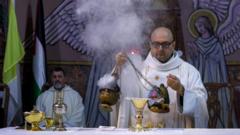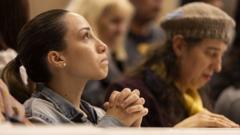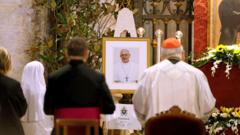As nations mourn the loss of Pope Francis, the Catholic Church faces the challenge of selecting a new leader, while reflecting on the late pontiff's progressive legacy.
**Pope Francis’s Passing Sparks Global Mourning and Legacy Reflections**

**Pope Francis’s Passing Sparks Global Mourning and Legacy Reflections**
The world unites in remembrance of Pope Francis following his death at 88, as preparations for his funeral and succession begin.
April 22, 2025, 5:54 a.m. ET
In the wake of Pope Francis's death, a solemn atmosphere blankets the globe as countries declare official mourning periods, commemorating the 88-year-old pontiff who passed after a stroke. Alongside memorial services and lowered flags, discussions surrounding his legacy and the future direction of the Roman Catholic Church intensify dramatically.
The Vatican has arranged for Pope Francis's funeral to take place at 10 a.m. Saturday, an event that will embody both a celebration of his life and the intricate, drawn-out process that follows the death of a pope. Moments after news of his passing spread, Cardinals from around the world have converged on Vatican City to pay their respects and to prepare for the crucial conclave that will select his successor.
Despite the pope's request for a modest burial without extravagance, the forthcoming rites reflect the complexity surrounding the selection of the church's new leader. By tradition, the ceremonies for a pope can span nearly nine days, culminating in intricate rituals held within St. Peter's Basilica. Yet, the real challenge lies ahead: the decision-making behind choosing a new pontiff. A total of 135 cardinals under the age of 80 hold the power to influence the direction of a church that serves approximately 1.3 billion adherents worldwide.
World leaders are expected to attend the funeral, including controversial figures like former President Trump, which accentuates the global geopolitical landscape's shifting dynamics since Francis began his papacy in 2013. This gathering symbolizes a stark contrast to the world scene during his tenure, where progressive leaders are increasingly being challenged by more authoritarian figures.
Cardinals are entering this transitional phase with mixed sentiments—some cling to Francis's progressive ideals, while conservative factions see this moment as an opportunity to potentially revert to traditionalist Church doctrines. If history is any guide, the next pope will not only influence the dynamics within the Church but also play a significant role on the world stage, especially given the contemporary global challenges.
While Pope Francis's death has marked a significant moment for the Catholic community, the legacy he leaves behind—a commitment to social justice, compassion for marginalized communities, and environmental advocacy—continues to resonate. Memorial services are being conducted globally with high attendance, illustrating the profound impact of his outreach efforts.
As tributes and reflections pour in from every corner of the planet, an overarching question lingers: what direction will the church take as it prepares to usher in a new spiritual leader? The choice made in the forthcoming conclave could not only redefine the Church's stance on key sociopolitical issues but also reshape its relationship with a complicated world that Francis sought ardently to understand and influence.
In the wake of Pope Francis's death, a solemn atmosphere blankets the globe as countries declare official mourning periods, commemorating the 88-year-old pontiff who passed after a stroke. Alongside memorial services and lowered flags, discussions surrounding his legacy and the future direction of the Roman Catholic Church intensify dramatically.
The Vatican has arranged for Pope Francis's funeral to take place at 10 a.m. Saturday, an event that will embody both a celebration of his life and the intricate, drawn-out process that follows the death of a pope. Moments after news of his passing spread, Cardinals from around the world have converged on Vatican City to pay their respects and to prepare for the crucial conclave that will select his successor.
Despite the pope's request for a modest burial without extravagance, the forthcoming rites reflect the complexity surrounding the selection of the church's new leader. By tradition, the ceremonies for a pope can span nearly nine days, culminating in intricate rituals held within St. Peter's Basilica. Yet, the real challenge lies ahead: the decision-making behind choosing a new pontiff. A total of 135 cardinals under the age of 80 hold the power to influence the direction of a church that serves approximately 1.3 billion adherents worldwide.
World leaders are expected to attend the funeral, including controversial figures like former President Trump, which accentuates the global geopolitical landscape's shifting dynamics since Francis began his papacy in 2013. This gathering symbolizes a stark contrast to the world scene during his tenure, where progressive leaders are increasingly being challenged by more authoritarian figures.
Cardinals are entering this transitional phase with mixed sentiments—some cling to Francis's progressive ideals, while conservative factions see this moment as an opportunity to potentially revert to traditionalist Church doctrines. If history is any guide, the next pope will not only influence the dynamics within the Church but also play a significant role on the world stage, especially given the contemporary global challenges.
While Pope Francis's death has marked a significant moment for the Catholic community, the legacy he leaves behind—a commitment to social justice, compassion for marginalized communities, and environmental advocacy—continues to resonate. Memorial services are being conducted globally with high attendance, illustrating the profound impact of his outreach efforts.
As tributes and reflections pour in from every corner of the planet, an overarching question lingers: what direction will the church take as it prepares to usher in a new spiritual leader? The choice made in the forthcoming conclave could not only redefine the Church's stance on key sociopolitical issues but also reshape its relationship with a complicated world that Francis sought ardently to understand and influence.






















